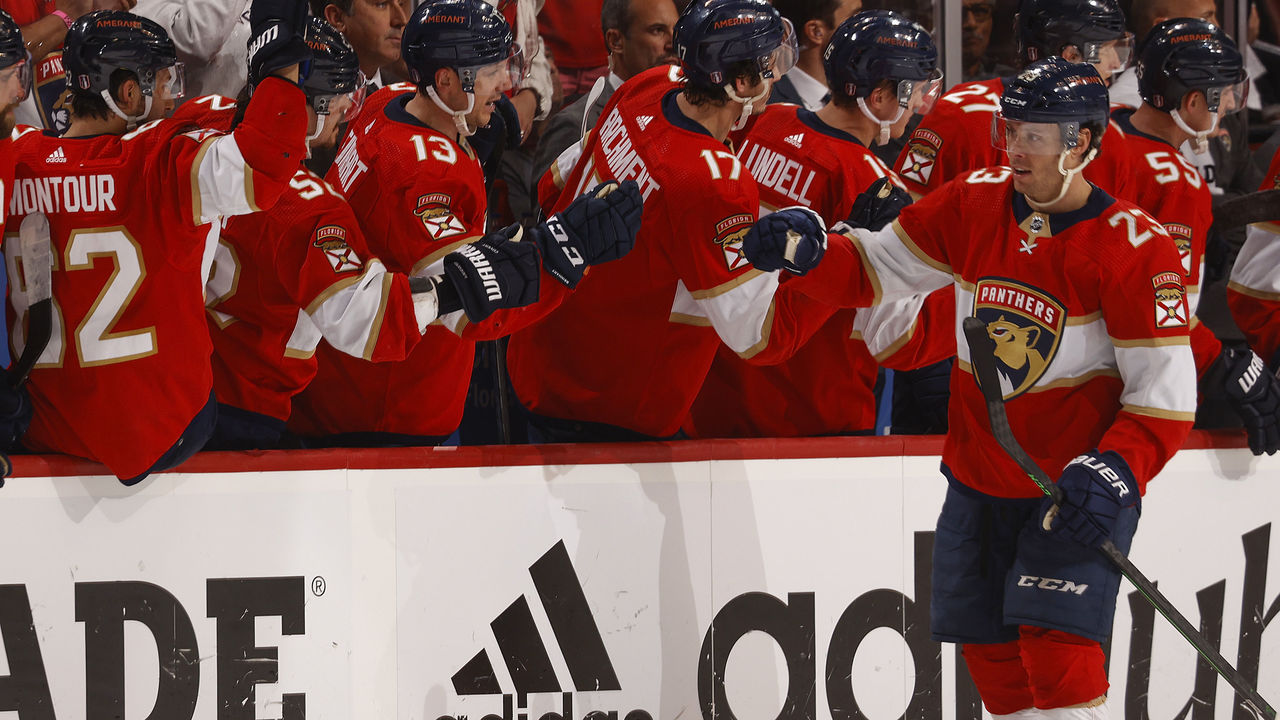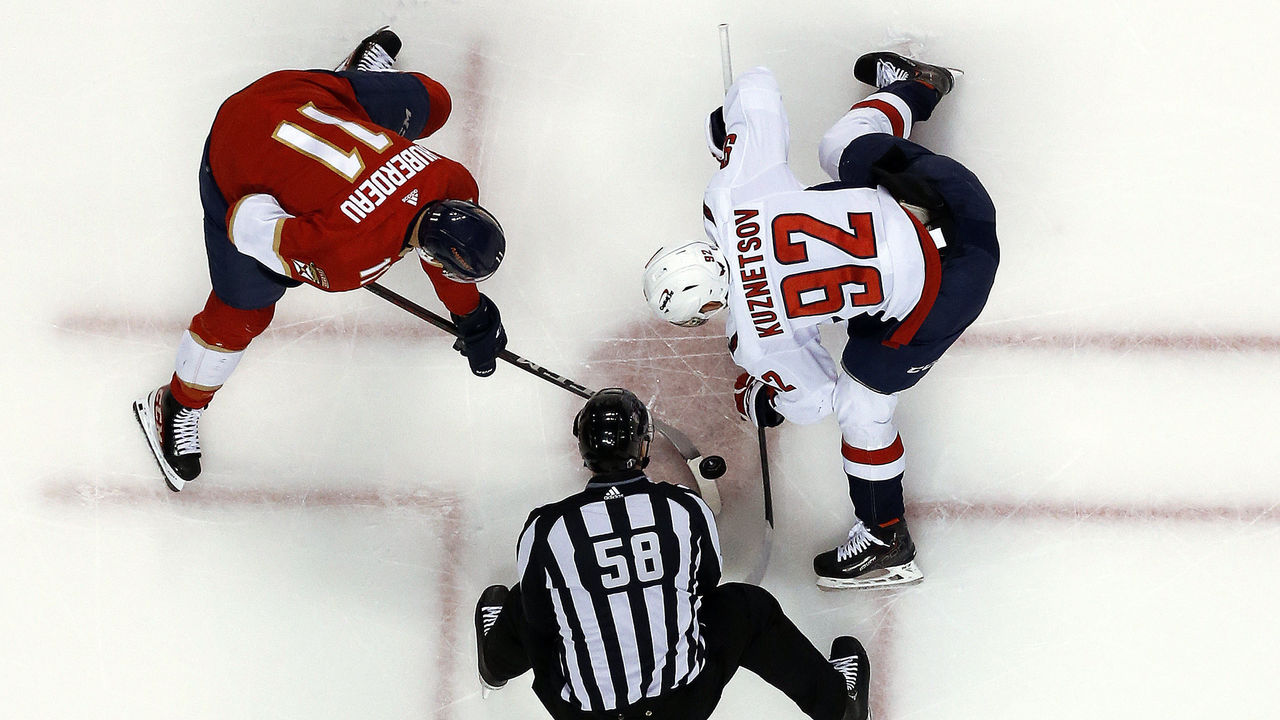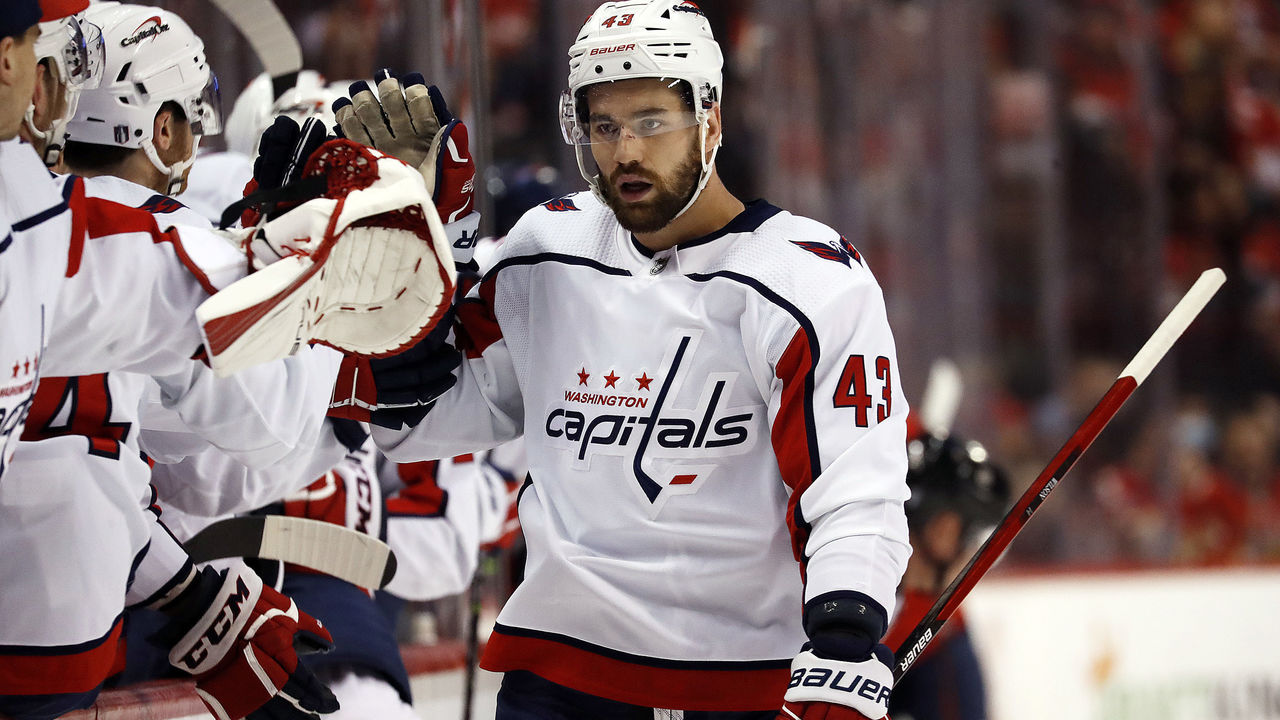What we've learned through 2 games of Panthers-Capitals
The Florida Panthers defeated the Washington Capitals 5-1 on Thursday at FLA Live Arena in Sunrise, Florida, to even the best-of-seven opening-round series. Here's what we've learned through two games of Panthers-Capitals:
Panthers are the predator

Dominant regular-season teams sometimes seize up come playoff time. It happens. Not all playing styles translate, especially those predicated on speed, skill, and constant motion from all five skaters and the puck.
So, there was a chance the Presidents' Trophy-winning Panthers wouldn't be the team dictating play in this series. A small chance, but a chance nonetheless. Stranger things have happened in the NHL postseason.
After two games, though, it's fair to say Florida's style does translate.
The Panthers are the predator and the Capitals are the prey, and it isn't particularly close. Guided by head coach Peter Laviolette, Washington is playing a completely reactive style in an attempt to minimize the best offensive team the league has seen in 26 years. In Game 1, the game plan actually worked.
The Capitals killed the Panthers' vaunted transition offense by clogging up the neutral zone. When Florida managed to enter Washington's zone with possession, the Capitals immediately built a shield around goalie Vitek Vanecek, forcing low-percentage shot attempts from outside the slot. They then bagged three goals in the final 12 minutes of regulation to turn a potential 2-1 loss into a 4-2 victory. It wasn't pretty, but they earned the win.

Game 1 was mildly shocking to watch live; one had to wonder if Washington was poised to topple the mighty Panthers in the first round. On second viewing, however, it seemed a little too good to be true for the Capitals. A few bounces went their way. The Panthers were reckless with the puck. And, as Florida head coach Andrew Brunette noted, the Panthers "kind of self-destructed" in the third period.
All of which brings us to the landslide that was Game 2. It was a course correction for Florida and probably a better reflection of where this series is headed.
Consider this: In Game 1, the Panthers generated seven high-danger shot attempts in 48 five-on-five minutes. In the same amount of five-on-five action in Game 2, they recorded 14 high-danger attempts and scored all five of their goals. Florida broke through the defensive shell often and made it count.
The 2-0 goal was textbook 2021-22 Panthers hockey - a perfect mix of player and puck movement, smart playmaking, and quick finishing. Superstars Aleksander Barkov and Jonathan Huberdeau are both unafraid to take risks with the puck and have the offensive tools to follow through on that bold mindset:
HUBY 🤝 BARKY
— Bally Sports Florida: Panthers (@BallyPanthers) May 6, 2022
The dynamic duo of Huberdeau and Barkov give the Panthers the 2-0 lead 🔥@FlaPanthers | #TimeToHunt pic.twitter.com/M5e4i85UxM
When the Panthers find their groove - as they did after a pedestrian opening 10 minutes in Game 2 - the floodgates tend to open. They're built and coached to play a "go, go, go" style.
"Our effort was good in the first game, too. We tried, but we didn't play smart. We gave away a lot of pucks, didn't play the right way, didn't play the way we wanted to," Barkov told reporters. "This game, we started the same way, but once the game went on, we kept getting better and better and realizing what's working for us and what's not, and then got the good lead and held on to it."
The 3-1 goal illustrated two other ingredients in the Panthers' recipe: their enviable depth up and down the lineup and their ability to counterattack at will. Here, for example, is Mason Marchment, one of 10 Panthers players to rack up 40 points or more in the regular season, burying a fast-break scoring chance with ease:
Mason Marchment responds quickly for the Panthers, zipping one five-hole through Vanecek!#TimeToHunt 3 - 1 #ALLCAPS
— Hockey Daily 365 (@HockeyDaily365) May 6, 2022
(Game 2, WSH Leads Series 1-0) pic.twitter.com/Is55KZKe1Y
The first two games have shown that the Capitals must play a nearly perfect defensive game to contain the Panthers' attack. Executing that plan three times in the next five games will be extremely difficult.
Wilson injury really stings

Tom Wilson has plenty of haters across the league, but there's no denying his importance to the Capitals. He can be an emotional leader, a physical leader, and, as we saw in Game 1 when he opened the scoring, an offensive leader.
The power forward missed Game 2 with an injury, and his status will be a point of great interest ahead of Saturday afternoon's Game 3 in Washington. Officially, Wilson is listed as day-to-day with a lower-body injury.
The Capitals aren't overly deep up front, with Conor Sheary subbing in for Wilson on the top forward line alongside Alex Ovechkin and Evgeny Kuznetsov on Thursday. The trio was on the ice for a goal against and lost the shot attempt battle 9-7 over eight minutes together in Game 2. That's not good enough.
Bobrovsky doing his part
Sergei Bobrovsky is a two-time Vezina Trophy winner coming off a solid regular season. Yet if there was one position to nitpick for Florida ahead of the postseason, it was goaltending. Despite his accolades, stretches of poor play litter Bobrovsky's resume. He doesn't inspire confidence like Andrei Vasilevskiy.
But so far, so good for Bobrovsky, who's stopped 60 of 64 Capitals shots. According to Natural Stat Trick, the 33-year-old Russian has saved 1.31 goals above average through two games. In other words, he's carrying his weight.
Special teams business
How might Game 1 have ended if Florida converted on one or both of its power-play opportunities? How lopsided would the score have been in Game 2 if the Panthers didn't go goalless on four chances?
The Capitals, meanwhile, have gone one-for-three on the power play in both games. Can their historically fantastic top unit - Ovechkin, Kuznetsov, Nicklas Backstrom, T.J. Oshie, and John Carlson - tilt the series in Washington's favor? It may be the only other way to counter Florida's high-octane offense.
John Matisz is theScore's senior NHL writer. Follow John on Twitter (@MatiszJohn) or contact him via email (john.matisz@thescore.com).